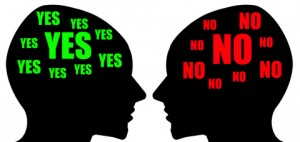Can Meditation Practice Affect How We View Our World? A Series of Articles
Part One – The Object of Our Emotion is Not its Cause
A funny thing happened on the way to the office today. Okay, it wasn’t really funny, and my office these days is The Laughing Goat Coffeehouse. While getting ready to prepare for the day, my wife made a request of me that seemed, to my sleep-deprived mind, unreasonable. Reasonable or not, whether the haze of sleep loss or the actual request was the trigger, the emotions that arose within my mind were ones of frustration and displeasure. Sound familiar?
When an emotion arises, positive or negative, based on attraction or repulsion, what goes on in our mind? Do we make the situation better or worse? Are we in control of the one thing that matters the most, our mind?
I know for that myself it seems much “easier” to place the blame of any strong emotion on something outside of myself. If desire arises, it’s easier to say, “that car looks great, I want it..,” or, “I wish that I was as fit as that guy.” And, if I’m feeling angry it’s much easier to say, “If only she wasn’t so….,” or, ” if you hadn’t done that I wouldn’t be so upset.” This is why relationships can prevent us from looking at ourselves, because it’s easy to say that the other person is the reason that we feel whatever it is that we’re feeling, and why relationships can also be the cause of strengthening our meditation practice.
Although it may seem easier to lay blame on what we believe to be the cause of our emotions, the spouse, car, boss, driver, etc; when we begin to examine what’s going on within our mind, what we come to realize – sometimes painfully – is that all of this “stuff” is occurring in our mind and not in the object that we’re projecting the feelings and emotions onto. There is no “out there” to blame it on.
If we assume, even for a moment, that this is true, then how do we go about changing patterns of projection and blame that we’ve reinforced for years? This is the part that I struggle with all of the time. I mean, seriously, if I have to take responsibility for how I’m feeling – all of the time – then that means that I can’t blame any of what I’m feeling on anything or anyone else!? I can’t blame my panic at being unemployed on the loss of a job? Or the desire to have a nicer place to live on the tiny condo that I’m living in now?
Before we explore the possible “how” of working with our emotions, let’s look at one great benefit of doing so. For me, what keeps me on track with this kind of work is this one, simple, elegant, and liberating thought; if I can really learn this and learn how not to blame other people or factors for what I’m feeling, then I can free myself from all of this emotional baggage that can interfere with how I am with others. In the case of healthcare, that means that I can show up at the bedside clear and free from distractions and projections. In the case of my relationships, that means that I can show up in my marriage able to see the wonderful person who I’m married to without yearning after some “perfect” relationship (is there such a thing?!?)
The very first step that we take in this journey is to just watch what happens within our mind when it begins to assign the emotion or feeling that we experience onto something “out there.” Simple? Not. But, for now, let’s do just that. Let’s work with the phrase, THE OBJECT OF OUR EMOTION IS NOT ITS CAUSE. The next time that any thought arises, or that any emotion arises, let’s work with it.
Right now, I’m smelling cigarette smoke, even though I’m sitting indoors. And I think, “could that person please smoke away from the building?!” And I feel irritated. Dropping the irritation, I can think, “I’m smelling the cigarette smoke, and it disturbs me that it’s coming into the coffeehouse.” Wait, I can’t smell it anymore! The person is gone. And no strong emotion is left hanging around. It’s done with. Kind of like that.
Let me know what you think; does this work for you? What happens when you try this? Leave a comment if you’d like, share your successes, and failures. There’s no right or wrong here; we’re just learning how to take what arises within our mind a little less seriously.
Stay tuned for Part Two, Anchoring the Awareness of Emotions in the Breath.




Leave A Comment